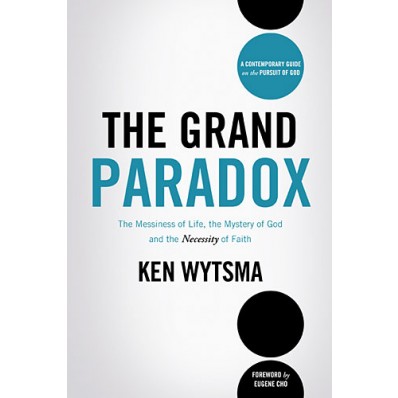Our current selection for Patheos Book Club is Ken Wytsma’s The Grand Paradox: The Messiness of Life, the Mystery of God, and the Necessity of Faith.
Wytsma’s book reads somewhat like a collection of sermons, and toward the end I found myself wondering if the loose arrangement of topics in the book might be explained by each chapter being originally an oral address which was then adapted into a book. Nonetheless, if there is a common thread that holds together the different chapters, it is the idea of paradox, that two seemingly opposite things can be true at the same time. Wytsma illustrates the counterintuitive nature of paradox with a story from his childhood in Holland:
Because I was so young, my mom was careful to communicate time and again the danger of falling through thin ice while skating. She repeatedly taught me that if I ever fell through the ice, I should swim for the dark–not the light–spot above me. This is certainly counterintuitive, but the ice itself looks white from underneath, while the hole in the ice–the path of salvation appears dark (10).
Wytsma point is that what is true may not be immediately obvious. It may, in fact, be the opposite of what feels or looks right. He contends that the walk of faith is full of counter-intuitive truths like this:
-
Die to live.
-
Serve to gain.
-
Give to receive.
-
Lose your life to find it.
-
The first will be last.
-
The weak will be strong.
-
Walk by faith, not by sight.
-
Suffering can be a blessing (12-13).
Sometimes I did feel Wytsma was overly general and did not always make his case for each individual paradox, and sometimes I felt he needed to develop the answer to the “why?” question better: Why make the leap of faith and decide to trust God? Just because? I also felt that although I agree that many paradoxes do lie at the center of the Christian faith–and at the center of life itself–that does not mean that every single truth in life is a paradox. Nevertheless, despite these caveats, I was rewarded with some great gems of wisdom throughout this book and with the author’s genuine heart to love God and neighbor. Like the writer of Proverbs, Wytsma sprinkles memorable sayings (from himself and other writers) throughout his text. Many of these are helpful correctives to much of today’s American Christianity.
For example, Wytsma actively engages how the way of Jesus challenges the American Dream in his chapter on justice, “A World Made Right.” He writes:
There’s some bad news involved in discovering what God is up to. Engaging in justice–and especially, seeking to redress injustice–is not the shortest route to fulfilling the American Dream.
In material terms, in terms of personal comfort and ease, living justly is likely to be counterproductive (51).












